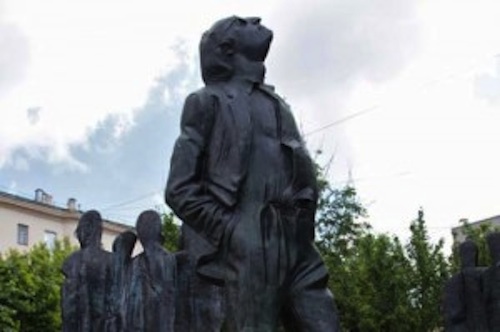Joseph Brodsky Sculpture Unveiled Near U.S. Embassy in Moscow
A monument to Russian-American poet Joseph Brodsky has been erected in Moscow—directly across from the U.S. Embassy—reports Russia Beyond the Headlines. The Nobel Prize-winning poet was exiled from the Soviet Union in 1972, moved to the States and never returned home. His statue "stands on a granite base looking up to the sky just off Novinsky Boulevard, yet his eyes appear to be closed. Nearby are sculpted silhouettes of twelve people in two groups, but Brodsky seems unaware, lost in his thoughts, clothes somewhat crumpled, hands in his pocket." Interestingly, it was paid for not by the state or city, but by sculptor Georgy Frangulyan, who has toiled for seven years to get one up, amidst lack of funds and public outcry.
Talking about the form of the sculpture, Frangulyan said it shows how a poet is alone but with a circle of followers. “Some people go through life like a shadow and some become individuals,” he said. . . .
The statue, located just across from the United States embassy, was unveiled at the end of May. Getting there was not a simple journey. . . .
It was the city’s idea that it should face the embassy.
“We looked for a place for a long time,” said Alexander Kuzmin, Moscow chief architect, in 2007. “We looked to see where the relatives of the poet lived. Then we asked ourselves a question: What most of all links Brodsky and Moscow? And we understood - the American embassy, from there he left the U.S.S.R.”
Brodsky actually left for Vienna, initially, but he did become an American citizen and poet laureate in 1991.
Reaction to the statue has been mixed with positive comments in the media, but grumbling by locals, still allergic to the gigantism of the Luzhkov era.
“In St. Pete, in Brighton Beach or in Venice is more apt than in Moscow,” wrote one user on LiveJournal, with another adding, “If I was his relative, I would sue.”
Others asked why it was in Moscow.
“There was some questions [about that] but [French writer Honore de] Balzac was not born in Paris and there is a statue of him there,” said Frangulyan.
“It is my own personal monument,” said Frangulyan. “I didn’t have a choice, as there was a crisis and all those who had promised money withdrew.”
Frangulyan wouldn’t say exactly how much it cost, but said it was a few million dollars.



